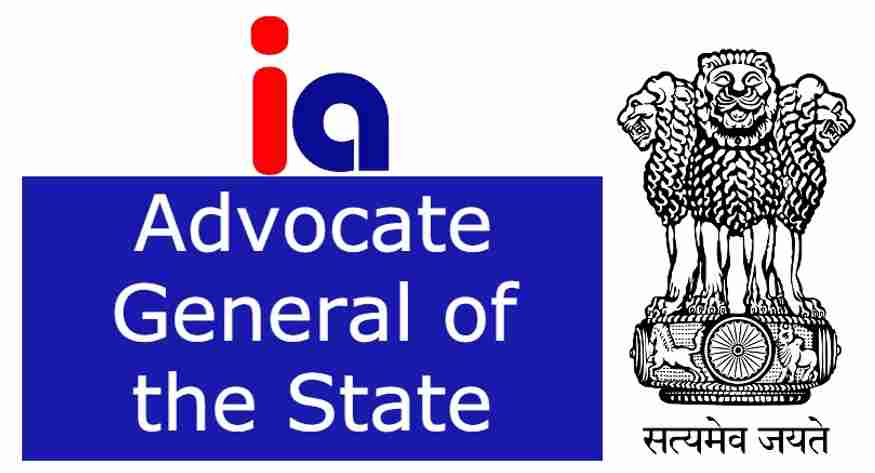- Umang Sagar
- Law, Recent article
Advocate General Of State

Definition
The highest law officer of the states in India is called the Advocate General of State.
- Some important points about the Advocate General of State in India, for UPSC, are:
- In the Order of Precedence, Additional Solicitor General is above the Advocate General of State.
- The right to be eligible for the post of Advocate General of State is conferred to only Indian citizens, and foreigners are not eligible to hold this public office.
- He has the full right to appear in any court of the state.
- He cannot vote in any proceedings of the houses of the state legislature or any committee initiated by the state legislature. He thought has a right to speak and be a part of such proceedings.
Appointment, Term, And Removal
Who appoints the Advocate General of State?
- The governor appoints the advocate general of state on the advice of the council of ministers of the state. The person who is eligible to hold the office of advocate-general in India must meet the following criteria:
He must be an Indian Citizen
He should be eligible to be appointed as the judge of the High Court, i.e., he must meet one of the following eligibility criteria:
- A barrister having experience of more than 5 years.
- A civil servant with an experience of more than 10 years along with an experience as a servant in Zila Court for at least 3 years.
- A pleader over 10 years in any high court
- He shouldn’t be more than 62 years of age, as is the age qualification for a High Court Judge.
Term and Removal of Advocate General of State:-
The Constitution does not fix the term of Advocate General in India. He remains in the office during the pleasure of the Governor.
The Constitution does not contain the procedure and grounds to remove the Advocate General of State. Governor can remove him/her at any point in time.
Resignation of Advocate General – He can resign from public office by submitting the resignation letter to the state governor.
- Conventionally, when a council of ministers of a state government resigns, the advocate general of state too puts down his papers.
Duties, Salary, And Functions
Functions of Advocate General of State:-
- The major duties and functions of the Advocate General of State are mentioned below:
He is responsible to advise the state government on the legal matters that the governor refers to him.
He must perform all the duties and legal characteristics as assigned to him by the state governor.
- He is bound by the Constitution for such duties and functions as is mentioned therein or any other constitutional law.
Salary of Advocate General of State:-
The remuneration received by the Advocate General of State is not fixed by the Indian Constitution. It varies according to the state. The State governor determines the salary of the advocate general in India.
- Some current updates regarding the salary of Advocate General of States (November 2020):
- The salary of law officers in Punjab has been increased by the state government:
- Junior Most Law Officer/Assistant Advocate General – Rs. 55000/month
- Deputy Advocate General and Senior Deputy Advocate General – Rs. 90000/month
- Establishment officers – Rs. 40000/month
- Advocate General – Estimated to be Rs. 1.25 lakh/month
Note: There can be junior, deputy, and senior advocates general in an office of the state advocate general.
Difference Between Advocate General And The Attorney General Of India
Article 76 of the Indian Constitution deals with the Attorney General of India, while Article 165 deals with the office of the Advocate General of India.
The office of Advocate General of State corresponds with the office of Attorney General of India as the former is the chief law officer of the state and the latter is the highest law officer of India.
Legal matters of the state are referred to the Advocate General while the legal matters of the union or the central government are referred to the Attorney General of India.
Aspirants can read the functions, appointments, powers, and important facts about the Attorney General of India, for UPSC in the linked article.
Articles Related To Advocate General In The Constitution

- The list of articles related to the office of Advocate General of State is mentioned in the table below:
Articles | Details |
Article 165 | Office of Advocate General of State |
Article 177 | Rights of Advocate General of State w.r.t the state legislature and its proceedings |
Article 194 | Powers, privileges, and immunities of Advocate General |
List Of Advocate General Of State
- The list of state-wise advocate general in India is given below:
State | Advocate General |
Andhra Pradesh | Subrahmanyam Sriram |
Arunachal Pradesh | Nilay Ananda Dutta |
Assam | Ramesh Chandra Borpatra Gohain |
Bihar | Lalit Kishore |
Chhattisgarh | Satish Chandra Verma |
Goa | Devidas Pangam |
Gujarat | Kamal Trivedi |
Haryana | Baldev Raj Mahajan |
Himachal Pradesh | Ashok Sharma |
Jharkhand | Rajiv Ranjan |
Karnataka | Prabhuling K. Navadagi |
Kerala | C. P. Sudhakara Prasad |
Madhya Pradesh | Purushaindra Kaurav |
Maharashtra | Ashutosh Kumbhakoni |
Manipur | Naorem Kumarjit Singh |
Meghalaya | Amit Kumar |
Mizoram | Biswajeet Deb |
Nagaland | K. N. Balagopal |
Odisha | Ashok Parija |
Punjab | Atul Nanda |
Rajasthan | Mahendra Singh Singhvi |
Sikkim | Vivek Kohli |
Tamil Nadu | Vijay Narayan |
Telangana | B. S. Prasad |
Tripura | Arun Kanti Bhowmik |
Uttar Pradesh | Raghvendra Singh |
Uttarakhand | S. N. Babulkar |
West Bengal | Kishore Dutta |
Top 13 Facts About Advocate General Of State
Article 165: Advocate-General of the State.
Article 177: Rights of Advocate-General as respects the Houses of State Legislature and its Committee.
Article 194: Powers, privileges, and immunities of Advocate General.
To give advice to the government of the state upon such legal matters which are referred to him by the governor.
To perform such other duties of a legal character that is assigned to him by the governor.
To discharge the functions conferred on him by the Constitution or any other law.
In the performance of his official duties, the advocate general is entitled to appear before any court of law within the state.
he has the right to speak and to take part in the proceedings of both the Houses of the state legislature or any committee of the state legislature of which he may be named a member, but without a right to vote.
He enjoys all the privileges and immunities that are available to a member of the state legislature.
The remuneration of the advocate general is not fixed by the Constitution. He receives such remuneration as the Governor may determine.
The term of office of the advocate general is not fixed by the Constitution. Further, the Constitution does not contain the procedure and grounds for his removal. He holds office during the pleasure of the governor.
He may be removed by the governor at any time. He may also quit his office by submitting his resignation to the governor. Conventionally, he resigns when the government (council of ministers) resigns or is replaced, as he is appointed on its advice.
He must be a citizen of India and must have held a judicial office for ten years or been an advocate of a high court for ten years.


